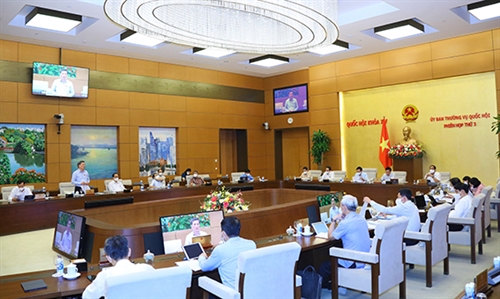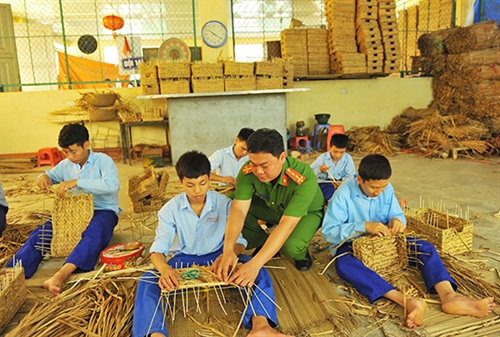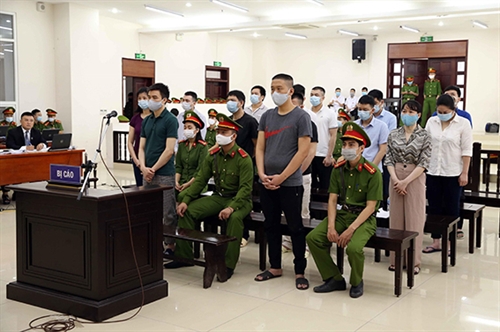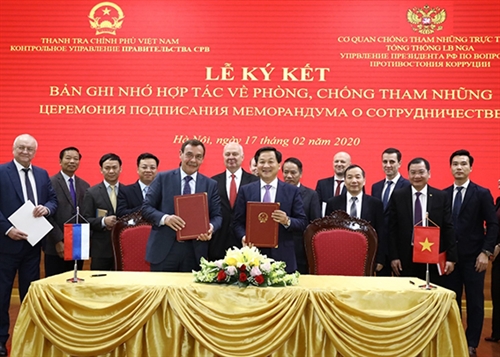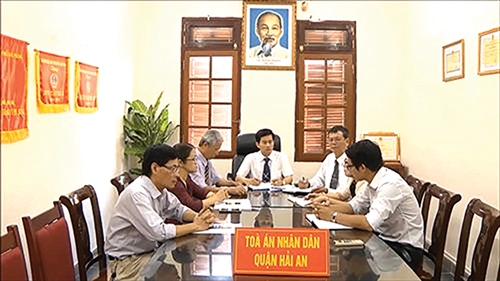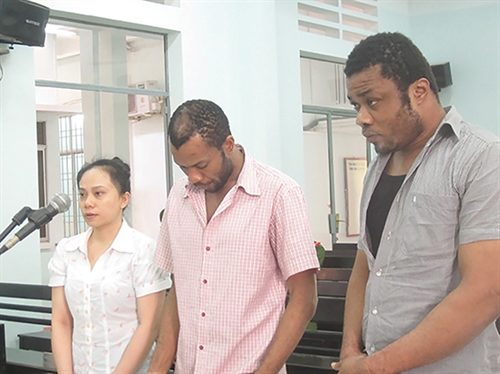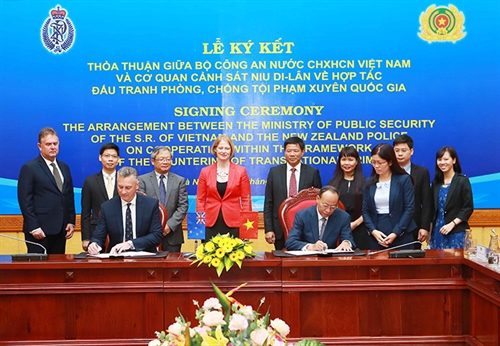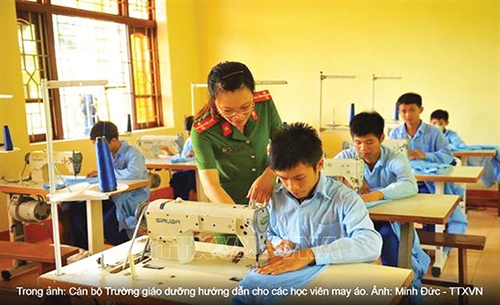Dinh Van Doan, LL.M.
Criminal Law Faculty, Ho Chi Minh City University of Law
Introduction
The protection of human rights of under-18 persons in criminal proceedings in general and their personal secrets in particular has always been of the international community’s concern. The 1948 Universal Declaration of Human Rights and the 1966 International Covenant on Civil and Political Rights both provide: “No one shall be subjected to arbitrary (or unlawful) interference with his privacy, family, home or correspondence, nor to unlawful attacks upon his honor and reputation. Everyone has the right to the protection of the law against such interference or attacks.”[1] In furtherance, the 1985 United Nations Standard Minimum Rules for the Administration of Juvenile Justice (the Beijing Rules) and the 1989 Convention on the Rights of the Child both stipulate that the juvenile’s right to privacy shall be respected at all stages; and no information that may lead to the identification of a juvenile offender shall be published since such may affect their access to education, employment, domicile or safety. Competent agencies shall be prudent about publication in the mass media of information about crimes allegedly committed by young offenders and shall limit exceptions.
As a State Party to the above conventions, Vietnam has set the goals of protecting and promoting the rights of the child in all domains of social life and translated relevant provisions of those conventions into its domestic laws. The 2013 Constitution contains provisions to best protect rights and interests of under-18 persons in all aspects of social life, including criminal proceedings. As the disclosure of information pertaining to privacy of under-18 persons may cause serious physical and mental consequences to them, the 2015 Criminal Procedure Code, revised in 2017, (the Code) and relevant sub-law documents all provide the keeping of secrets of under-18 persons in criminal proceedings. Below the author would like to take some insights into those provisions before making recommendations to improve the criminal procedure law and relevant laws regarding this issue.
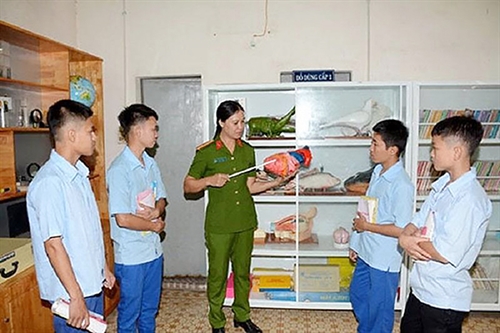 |
| A learning session of students at the Ministry of Public Security’s Reformatory No. 4 in Dong Nai province__photo: https://anninhthudo.vn/ |
Criminal procedure law’s provisions on keeping of personal secrets of juveniles
Human rights in general and the right to privacy of under-18 persons provided in the Code in particular are recognized in the 2013 Constitution[2]. In pursuance to the relevant provisions of the 2013 Constitution, the Code recognizes and protects personal secrets on fundamental principles provided in Chapter II, including those for guarantee of rights of individuals, particularly under-18 persons, to inviolability of residence, private life, personal secrets, family secrets, and safety and privacy of correspondence, telephone conversations and telegrams in criminal proceedings.
Personal secrets of under-18 persons in criminal proceedings may also be kept under the Code’s provisions on the principle of public trial which is constitutionalized[3]. Public trials are importantly significant to improving the people’s sense of law observance and access to information about criminal proceedings, facilitating fair, just and comprehensive settlement of criminal cases, helping protect human rights and detecting errors in stages of investigation, prosecution and trial. However, in special cases in which under-18 persons should be protected or their privacy should be kept, courts may conduct in-camera hearings but will pronounce judgments publicly[4]. This provision is novel, aiming to best protect under-18 persons in criminal proceedings in conformity with international law on juvenile justice. This provision is specified in Article 423.2 of the Code: “In a special case in which it is necessary to protect a defendant or victim aged under 18, the court may decide to conduct an in-camera hearing.” It is further clarified in the Supreme People’s Court’s Circular 02/2018/TT-TANDTC guiding trial of criminal cases in which one or more than one proceeding participant is/are under-18 person(s) under jurisdiction of the family and minor tribunal[5]. However, this Circular only specifies cases of in-camera hearings for under-18 victims. For under-18 defendants, the court (chief justice) may decide to hold public or in-camera hearings, regardless of whether they so request or not.
Based on the Convention on the Rights of the Child and the Beijing Rules, the Code also sets out principles on conducting criminal proceedings for under-18 persons, including that on keeping their personal secrets[6]. More specifically, in criminal proceedings, proceeding-conducting bodies and persons as well as proceeding participants are responsible for keeping privacy of under-18 persons (both victims and defendants) in order to ensure their healthy development in the future.
Public notification of legally effective court judgments and rulings on courts’ portals is necessitated under Politburo Resolution 49-NQ/TW dated June 2, 2005, which requires courts to step by step transparently make public their judgments and rulings, thus guaranteeing the right of citizens to access legal information and facilitating the people’s supervision of court adjudication[7]. However, for cases involving under-18 persons, in order to keep their personal secrets, Article 4 of Resolution 03/2017/NQ-HDTP of the Supreme People’s Court’s Judicial Council specifies court judgments and rulings that may not be publicized, including judgments and rulings on cases and matters settled at in-camera hearings or involving under-18 proceeding participants or containing personal or family secrets not yet encrypted under regulations.
In sum, the Code and relevant legal texts recognize and guarantee the protection of personal secrets of under-18 persons at different levels. The Code sets out fundamental principles which serve as guidelines for formulation and application of other relevant provisions on protection of lawful rights and interests of under-18 persons participating in criminal proceedings. More specifically, the Code and guiding texts provide in-camera hearings for special cases in order to protect under-18 victims and defendants through keeping their personal secrets.
Inadequacies of current provisions on keeping of personal secrets of juveniles and recommendations for improvement
The Code and sub-law documents concerning the keeping of privacy of under-18 persons reveal certain shortcomings that need further improvement.
Firstly, Article 414 of the Code should be added with specific provisions guiding the principle of keeping privacy of under-18 persons, as follows: “In criminal proceedings, proceeding-conducting bodies and persons shall keep confidential personal secrets of under-18 persons. Agencies, organizations and individuals involved in criminal proceedings may not collect, provide, publish or reveal personal secrets of under-18 persons. Any acts violating regulations on keeping of personal secrets of under-18 persons shall, depending on their nature and severity, be handled in accordance with law.” Based on the contents of this principle, lawmakers should work out specific provisions to detail this principle in a practical and uniform manner.
Secondly, as the Code and guiding texts have not yet formed a complete legal framework to practically guarantee the keeping of privacy of under-18 persons, there should be a separate institution on keeping of personal secrets of under-18 persons in the criminal procedure law. Technically, three options below are proposed to provide the keeping of privacy of under-18 persons:
(i) As the Supreme People’s Court is currently drafting a bill on protection of under-18 persons in special legal circumstances, the author recommends inclusion of all provisions concerning keeping of personal secrets of under-18 persons in a separate chapter or section of the bill.
(ii) Provisions on keeping of privacy of under-18 persons should be added to the Code’s Chapter XXVIII on procedures applicable to under-18 persons, especially provisions on matters to help keep personal secrets of under-18 persons.
(iii) It is proposed to issue new legal texts to guide the Code’s provisions on keeping of personal secrets of under-18 persons in criminal proceedings.
In the author’s view, the third option is just a provisional measure because this issue should be regulated by a law as it is important in the criminal justice for juveniles. That’s why the author advocates the first option since most countries around the world have enacted an act to handle special legal circumstances involving under-18 persons (i.e., the juvenile justice act). The inclusion of all issues related to under-18 persons in a separate legal instrument will ensure legal uniformity and consistency.
Thirdly, the regulations on keeping of privacy of under-18 persons should define personal secrets of under-18 persons, entities responsible and obliged to keep personal secrets of under-18 persons in different proceeding stages; and provide measures to keep personal secrets and handle violations.
In order to distinguish personal secrets of under-18 persons from personal secrets in general, the author suggests a clearer definition of personal secrets of under-18 persons in criminal proceedings as follows: “Personal secrets of under-18 persons are a combination of personal information which, once disclosed, might cause inconveniences to their social relations. Personal secrets of under-18 persons include information about their names, age, personal identification characteristics, health status and privacy as stated in their medical records, personal images, their family members and caretakers, their representatives and guardians, their personal assets, telephone numbers, personal mail and telegraph addresses, personal social media accounts, their places of residence and native places, their addresses, schools, classes, study results and friendship relations, and services provided to them.”
Regarding keeping of personal secrets through proceeding stages: The Code and guiding texts only provide in-camera hearings for defendants and victims in some law-specified cases in order to protect under-18 defendants and victims in the stage of adjudication. For other proceeding stages such as initiation of criminal cases, investigation, prosecution, trial according to cassation or reopening procedures, and execution of criminal judgments, there is no specific provision enabling the protection of privacy of under-18 persons. Whereas, information pertaining to personal secrets of these people might be disclosed in different forms in all proceeding stages. So, it seems senseless if providing that in-camera hearings aim to protect personal secrets of under-18 persons as their personal information might be disclosed in the stages of initiation of criminal cases, investigation and prosecution. The author therefore proposes adding provisions on keeping of personal secrets of under-18 persons in all proceeding stages.
With respect to responsibility of competent bodies and persons to protect privacy of under-18 persons: The Code should define the responsibility of bodies competent to conduct proceedings in every proceeding stage to apply lawful measures to keep personal secrets of these people. Accordingly, in the stage of initiation of criminal cases, this responsibility should be assumed by investigative bodies, bodies assigned to carry out a number of investigating activities, procuracies and trial panels. In the stage of investigation, this responsibility should rest with investigative bodies, bodies assigned to carry out a number of investigating activities, and procuracies. In the stage of prosecution and trial, this responsibility must be taken by procuracies and courts, respectively; and in the stage of judgment execution, this responsibility should be shouldered by competent bodies in criminal judgment execution activities.
With regard to measures and methods to be applied to keep personal secrets of under-18 persons in proceeding stages: In proceeding stages, competent bodies and persons have to protect personal secrets of under-18 proceeding participants by not providing information classified as personal secrets to other individuals, agencies and organizations, particularly press agencies. They also have to prevent those irrelevant to criminal cases from accessing files and documents containing such information. They have to request proceeding participants, particularly those entitled to access to case files, documents and evidences, not to provide, use or publish such information. Particularly in the stage of trial, in addition to the above measures and methods, courts may decide to hold in-camera hearings and then publicly pronounce judgments and rulings in a fashion not susceptible of revealing such secrets, or refrain from publishing judgments and rulings on the Portal of the Supreme People’s Court.
As for responsibility of related individuals, agencies and organizations to keep personal secrets of under-18 persons: The current criminal procedure law has no provisions binding on individuals and entities involved in the process of settlement of criminal cases. Hence, such provisions are needed to prevent such individuals and entities from revealing secrets of under-18 persons. Furthermore, the Code should have reference provisions for handling violators of the regulations on protection of personal secrets of under-18 persons in criminal proceedings.
Fourthly, the author recommends some amendments to the Code regarding keeping of personal secrets of under-18 persons, specifically: Article 25 should be re-read as: “In case of necessity to protect under-18 persons, the court may decide to hold in-camera hearings but shall publicly pronounce judgments.” In addition, Article 423.2 needs to be revised into: “In criminal cases involving under-18 defendants and/or victims, the court may decide to hold in-camera hearings.”
The Code should additionally provide the right of under-18 proceeding participants and their representatives to request bodies competent to conduct proceedings to keep personal secrets of under-18 persons.
The obligation of proceeding participants to keep personal secrets in general and personal secrets of under-18 persons in particular should be added since the Code currently provides only the obligation of defense counsels to refrain from disclosing information about criminal cases or criminally charged persons they know while performing the defense, unless these persons give their written consent[8], and obligation of witnesses, expert witnesses, property valuators, interpreters and translators to keep investigation secrets that they know when participating in proceedings.-
[1] Article 12 of the 1948 Universal Declaration of Human Rights, and Article 17 of the 1966 International Covenant on Civil and Political Rights.[2] Article 21 of the Code:“1. Everyone has the right to inviolability of private life, personal secrets and family secrets;...The security of information about private life, personal secrets and family secrets shall be guaranteed by law.2. Everyone has the right to privacy of correspondence, telephone conversations, telegrams and other forms of private communication.”[3] Article 103.3 of the 2013 Constitution:“People’s courts shall hold their hearings in public. In a special case which requires protection of state secrets, conformity with the fine customs and traditions of the nation, protection of minors or protection of private life and at the legitimate request of an involved party, people’s courts may hold in-camera hearings.[4] Article 25 of the Code.[5] Article 7.1.d of this Circular: “For cases involving victims aged under 18 who are sexually abused, assaulted or trafficked, courts shall hold in-camera hearings. For other cases in which under-18 persons or their representatives so request or in order to protect their privacy or themselves, courts may also hold in-camera hearings but shall pronounce judgments publicly.”[6] Article 414.2 of the Code.[7] Specifically, this requirement is guided by the Supreme People’s Court’s Judicial Council in Resolution 03/2017/NQ-HDTP on public notification of court judgments and rulings on portals of courts, and in the Supreme People’s Court’s Official Letter 144/TANDTC-PC on the implementation of Resolution 03/2017/NQ-HDTP.[8] Article 73.2.g of the Code.
